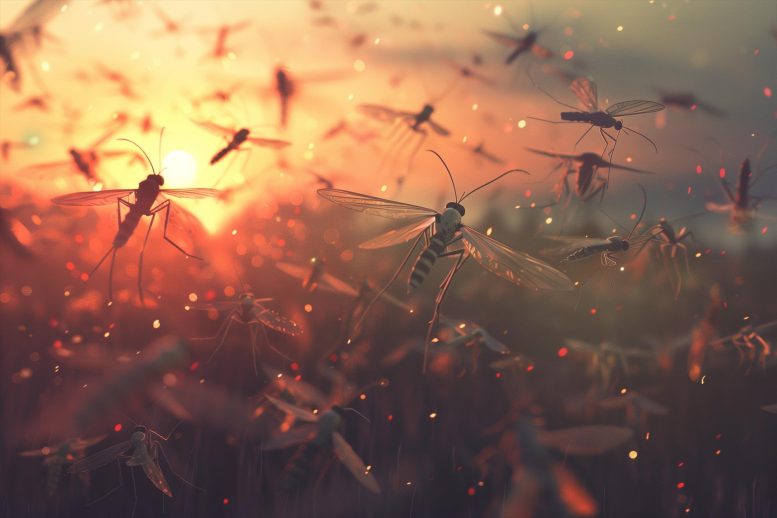
A Johns Hopkins study revealed that an enzyme in fruit fly testes could hinder insect reproduction by managing bromotyrosine accumulation, presenting a novel method for managing pests that threaten agriculture and spread diseases.
A novel way to curb nagging insects has been flying under our radar—an enzyme from fruit fly testes.
The compound could control bugs that carry disease and harm crops by stunting their ability to procreate, according to new research by Johns Hopkins University.
“We have a toe in the door to control fruit fly populations with this enzyme,” said Steven Rokita, a professor of chemistry at Johns Hopkins who led the research. “It could offer a good way to control the fertility of all kinds of biological and agricultural pests, starting with mosquito populations.”
The findings were published in Proceedings of the National Academy of Sciences.
Surprising Ubiquity and Function of the Enzyme
Rokita’s group stumbled upon the discovery while studying how iodide works in the thyroid gland. The team previously demonstrated the ubiquity of the enzyme iodotyrosine deiodinase, which seemed to play an unexpected role in key physiological processes of certain bacteria, invertebrates, and many other organisms.
The new insights show suppressing it in fruit flies leads to an overload of bromotyrosine, a natural variation of the common amino acid tyrosine. Too much of that compound hinders the insect’s sperm-making ability.
Implications for Spermatogenesis in Fruit Flies
Scientists previously thought the enzyme was limited to organisms that generate thyroxine, one of the thyroid hormones produced by all vertebrates, including mammals, birds, reptiles, amphibians, and fish. The enzyme’s job is to keep the body’s iodine levels at healthy thresholds to produce thyroid hormones, which regulate metabolism, growth, and other functions.
“To our surprise, this enzyme is in a huge number of animals, some bacteria, fruit flies, sea anemones—all kinds of organisms that don’t need iodide,” Rokita said. “What’s it doing there if these organisms don’t need it?”
By removing and dissecting the testes of fruit flies, the team tracked how the enzyme regulates bromotyrosine levels. When they turned off the specific gene responsible for the enzyme, they saw bromotyrosine build up in the fruit fly testes.
Potential Pest Control Applications
“It turns out that if the enzyme is lacking, bromotyrosine accumulates in male fruit flies, and that overload severely inhibits spermatogenesis,” Rokita said. “All flies have a similar gene, which means they might react to bromotyrosine in a similar way.”
Potential pest control strategies could include using standard sugar-based mosquito traps mixed with bromotyrosine or other substances that stop the enzyme from working, Rokita said.
Research Expansion and Safety Considerations
The scientists are testing their findings on mosquitoes with the Johns Hopkins Malaria Research Institute.
Enzymes are proteins that help speed up various biological processes that sustain our bodies. Even though the enzyme in question is like a mammalian enzyme of similar function, humans don’t express it in their testes, and bromotyrosine is unlikely to affect human fertility, Rokita said.
Unexplored Biological Processes and Their Significance
The findings show the value of exploring biological processes scientists often ignore, Rokita said. Specifically, the findings show many living things rely on the process of halogenation, where bromine or similar elements are added to molecules like the amino acid tyrosine to control key bodily functions.
This reaction is common to many organisms, but its function had only been clearly defined in the thyroid, Rokita said.
“This is opening our eyes to the idea that halogenation of tyrosine might be common and very important either because it’s detrimental or because it’s some kind of regulatory response that we had missed all this time,” he said.
Reference: “Misregulation of bromotyrosine compromises fertility in male Drosophila” by Qi Su, Bing Xu, Xin Chen and Steven E. Rokita, 15 May 2024, Proceedings of the National Academy of Sciences.
DOI: 10.1073/pnas.2322501121
Other authors are Qi Su, Bing Xu, and Xin Chen, all of Johns Hopkins.
The research was supported by the National Institutes of Health R01GM130937, R21AI119540, R01HD102474, and R35GM1270775, and the Howard Hughes Medical Institute.